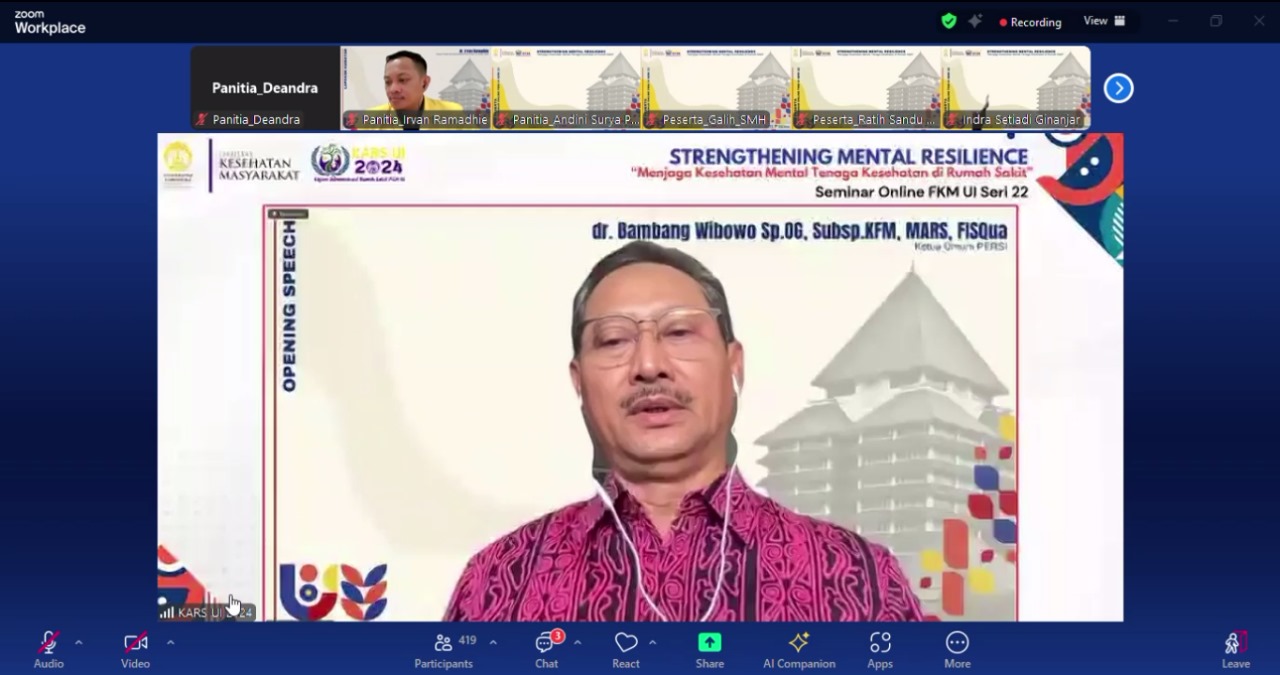On Saturday, November 16, 2024, the Faculty of Public Health (FPH) Universitas Indonesia (UI) held the 22nd Online Seminar (SEMOL) with the theme “Strengthening Mental Resilience: Maintaining the Mental Health of Healthcare Workers in Hospitals” featuring experts in the field.
Dr. dr. Helda, M.Kes., Coordinator of the Intermediate Public Health Course, gave a welcome speech and expressed her support for the event. “This theme is highly relevant, especially for healthcare workers who are on the front lines of facing various pressures and challenges in hospitals and other healthcare settings. Mental health is key to staying professional, maintaining service quality, and safeguarding one’s own health. Through this theme, we invite all parties to understand more deeply how to build mental resilience as healthcare workers in the face of challenging work situations and daily routines,” Dr. dr. Helda, M.Kes., stated in her speech.
Similarly, Dien Anshari, S.Sos., M.Si., Ph.D., Manager of Student Affairs, also expressed her support and a welcome address. “This topic aligns with current issues surrounding mental health in the workplace. We need multi-party collaboration because mental health at work is not something that can stand alone. We warmly welcome this topic, especially considering the ever-changing world, which requires better adaptive responses,” said Dien Anshari, Ph.D.
Dr. Bambang Wibowo, Sp.OG, Subsp.KFM., MARS, FISQua., Chairman of PERSI (Indonesian Hospital Association), also expressed his gratitude for the event. “The Indonesian Hospital Association thanks FPH UI. As an association that emphasizes human resources, we understand the challenges faced by healthcare workers, who are the key asset in providing quality healthcare to patients. We hope that mental health issues have been adequately prepared for since students begin their education and training as healthcare workers. This is because both individual and environmental factors need to be well-prepared in order to achieve the vision and mission set out,” said Dr. Bambang Wibowo.
The first session was presented by Dr. Imran Pambudi, MPHM, Director of Mental Health at the Ministry of Health of the Republic of Indonesia. He explained that resilience is one of the strategies to strengthen an individual’s mental health by managing and adapting effectively to life’s stressors.
According to Riskesdas 2028, the urgency of mental health problems affects 6.3% of private-sector employees and 3.9% of civil servants/TNI/POLRI/BUMN/BUMD with emotional mental disorders, while 4.3% of private-sector employees and 2.4% of civil servants/TNI/POLRI/BUMN/BUMD experience depression. Data from the PKTK3 UI 2022 Research on Workplace Exposure Sources showed that mental health issues reached over 80%, attributed to work demands with inadequate equipment and excessive workloads.
“Resilience is crucial for healthcare workers. Healthcare professions, such as doctors, nurses, and other medical staff, face significant physical and emotional challenges every day. With strong resilience, healthcare workers can endure better under pressure and become more effective in providing care to patients,” Dr. Imran Pambudi, MPHM, stated.
Meanwhile, the topic of “Mental Health Issues for Healthcare Workers” was presented by Dr. Zulvia Oktanida Syarif, Sp.KJ., Psychiatrist/Mental Health Educator. Dr. Zulvia explained that healthcare workers are more vulnerable to stress and burnout because they are responsible for human lives, and their actions (or lack thereof) can have serious consequences for patients.
“There are several factors that can trigger burnout among healthcare workers, including young age, being female, having more than 10 years of work experience, excessive workloads, and units such as ICUs, which have a more significant impact in triggering burnout,” explained Dr. Zulvia Oktanida. “Therefore, it is important to maintain mental health at the workplace, such as by maintaining a work-life balance, taking breaks by turning off screens or gadgets, practicing self-care like getting enough sleep, and building resilience within oneself,” she added.
Further, Dr. dr. Iqbal Mochtar, M.P.H., M.K.K.K., Dipl.Card., DoccMed., Sp.OK., Head of the Medical and Health Cluster at the Indonesian International Scientists Association, presented a session on “Stress Management in the Digital Era.”
Dr. Iqbal Mochtar outlined four tips for stress management in the digital age. The first tip is to recognize and acknowledge emotions, limit use, and turn off notifications while working. The second tip is mindfulness, a practice of full awareness, focusing on the present state and condition without judgment. The third tip is time management for gadget and social media use, and the fourth is self-care practices, essential for contributing to a better quality of life.
The final session was presented by Dr. dr. Ihsan Oesman Sp.OT, Subsp.KP., Head of the Orthopedic and Traumatology Program at FKUI–RSCM. He explained that mental health resilience policies should be top-to-bottom, requiring collaboration and coordination between the government, hospital directors, deans, departments, and individuals.
In addressing these issues, there must be a risk assessment for health, using its stratification. For severe risks, suicidal tendencies may be identified, with more than two domains showing extremely severe interpretations. For moderate risks, thoughts of ending life may be present, along with more than two domains indicating severe burnout. For light risks, there is no indication of severe or moderate risks.
Dr. dr. Ihsan Oesman emphasized that resilience efforts must be comprehensive and continuous, and the ability of individuals to adapt in facing challenges is the expected outcome.
This 22nd SEMOL series from FPH UI successfully highlighted a very relevant and important topic for the well-being of healthcare workers, focusing on strengthening mental resilience in the face of hospital challenges. Through various presentations from experts, participants gained valuable insights into the importance of mental health for healthcare workers and the various strategies that can be implemented to maintain physical and emotional balance in the workplace. As a profession often exposed to high pressures, building mental resilience is key to ensuring healthcare workers can continue to provide the best service while maintaining their quality of life. It is hoped that through collaboration between various parties, mental health issues for healthcare workers will continue to be addressed and improved to create a healthier and more productive work environment. (ITM)

